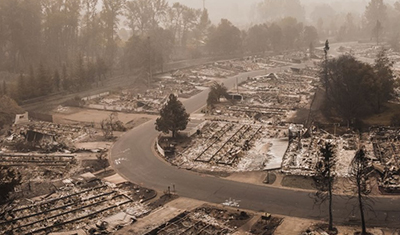
RIHA Releases Collection of Essays on Impact of Climate Change on Real Estate Finance

The Mortgage Bankers Association’s Research Institute for Housing America published a new collection of essays addressing the impacts of climate change on the real estate finance industry.
“RIHA asked a group of experts in their fields to weigh in on this important topic. These essays address the impacts of climate change and how the industry can prepare for increased regulatory and investor scrutiny on the quantitative estimates of climate-related risks. It is important to understand how climate change may impact the housing industry and its customers,” said Edward Seiler, RIHA Executive Director and MBA Associate Vice President of Housing Economics.
The publication, A Collection of Essays on Climate Risk and the Housing Market, was developed in response to growing interest from industry participants on how various issues connect to climate risk. The study features four essays from industry experts that focus on topline issues related to climate risk and its impact on the housing market. Volume I includes two essays written by Ceres Accelerator for Sustainable Capital Markets, and RiskSpan Inc. The final two essays from the study will be released in Volume II in March —an essay by Milliman Inc. on climate change and insurance markets, and an essay by Andrew Davidson & Co. Inc. on incorporating climate risk into mortgage models.
“RIHA’s new collection of thoughtful essays addresses the impacts of climate change and how we hope the industry prepares rapidly to face the increased risks,” said Steven Rothstein, Managing Director of Ceres, and Co-Author of Housing Finance and Climate Risk: Taking Action in an Uncertain Future. “As climate change becomes more of a topline issue, it is also important for the industry to understand its impacts and to develop standardized disclosures that are essential to well-functioning markets.”
“While regulators and boards increasingly insist that holders of mortgage and other housing assets take steps to incorporate climate into their risk management protocols, these mandates seldom come with an instruction manual,” said Janet Jozwik, Head of Climate Risk and ESG, RiskSpan Inc., and Co-Author of A Practical Approach to Climate Risk Assessment for Mortgage Finance. “Herein we provide practical advice to risk managers and others seeking to quantify climate risk and responsibly manage their exposure to it.”
Ceres Accelerator for Sustainable Capital Markets prepared the opening essay for the study, Housing Finance and Climate Risk: Taking Action in an Uncertain Future. Key takeaways include:
- The housing and mortgage industries have a central and outsized role in mitigating the risks of climate change and financing the transition to a sustainable future.
- Managing climate-related risks, ensuring equitable access to credit, and meeting the nation’s pressing housing needs are linked to systemic challenges.
- Climate risks cannot be addressed by either government or the private sector alone, both must work together toward bold and innovative solutions.
- All mortgage originators have opportunities to raise borrowers’ awareness of climate-related risks and increase access to financing for improvements that make homes more resilient and sustainable.
RiskSpan Inc. wrote the second essay, A Practical Approach to Climate Risk Assessment for Mortgage Finance. The essay lays out a pragmatic framework for assessing climate-related risks from the perspective of a mortgage company. Key takeaways include:
- The housing market faces unique risks from natural hazards and climate risk due to the nature of the asset and the intricacies of risk sharing (property insurer, homeowner, GSE, servicer, and investor).
- Acute climate events that seriously damage or destroy homes affect the timing of mortgage cash flows and can impact the overall performance of a mortgage portfolio, particularly when insurance proceeds are used to prepay loans.
- Home-price impacts due to climate change will ultimately depend on the extent to which potential homebuyers believe the climate poses a substantial risk to a given community. As information becomes more readily available (and believed), climate risk will gradually get priced into home values.
- Incorporating climate risk into existing enterprise risk management practices is likely a multi-year process. Initial goals should be to make incremental progress that can be iterated and improved over time.
- Incorporating scenario analyses into existing risk management activities will help build intuition and understanding within the organization related to climate risk.
In September 2021, RIHA released The Impact of Climate Change on Housing and Housing Finance, a study divided into four sections: what is known so far about climate change; the likely impacts to housing and housing finance; strategies that can mitigate climate change or adapt to the part of climate change that cannot be averted; and the ways firms in housing and housing finance can articulate and measure their exposure to climate change.
RIHA is a 501(c)(3) trust fund. RIHA’s chief purpose is to encourage and assist – through grants to distinguished scholars and subject matter experts, educational institutions, research facilities, and government organizations – establishment of a broader-based knowledge of mortgage banking and real estate finance. You can find additional studies on RIHA’s website: www.housingamerica.org.
